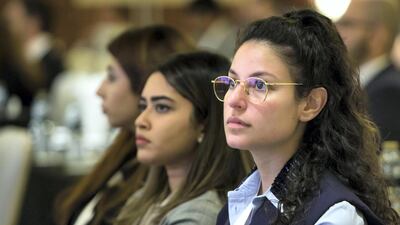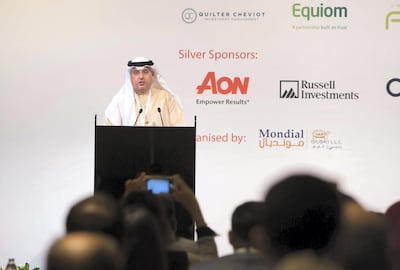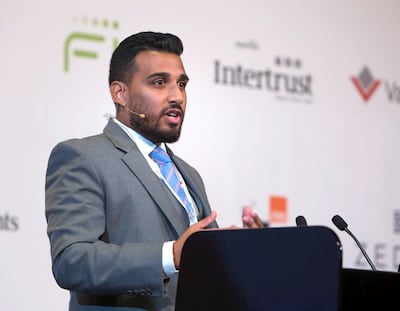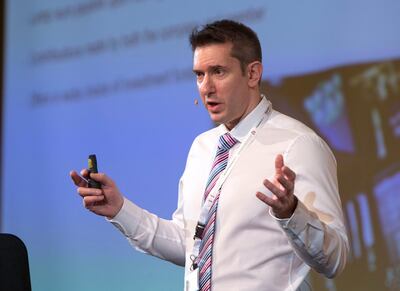The UAE's end-of-service gratuity is set for an overhaul.
That was the message from last week’s End of Service Benefits Conference in Dubai when Abdulrahman Al Awar, director general of the Federal Authority for Government Human Resources, said studies are being carried out to enhance and improve the system to help companies attract and retain talent, and ensure they can adequately fund the liability.
“The accelerating global technological advancements, and the increased retirement age and years of service, leave no doubt that there is an excellent opportunity and an urgent need in the region to establish investment funds to manage retirement and end-of-service benefits,” Mr Al Awar told delegates at the event.
What those changes may look like and the timeline for implementation is still unclear.
We examine what the options are and how they might affect UAE residents.
What is the gratuity entitlement now?
The defined benefit is decided by an employee’s length of service and final basic salary at the time of leaving. Employees are entitled to a gratuity after completing one year of service, with those that have worked between one and five years paid 21 days of basic pay. After five years, they are entitled to 30 days of basic pay for each year served after that.
Philip Wheeler, senior manager and pensions actuary at Ernst and Young, says an employee who serves 15 years of service and leaves on a basic salary of Dh10,000 a month will effectively receive an end-of-service gratuity of about Dh135,000.
“If you convert that into a retirement income, that could only provide an income of 5 per cent of the final basic salary as a regular income,” he says. “The month before you leave you receive a salary of Dh10,000, the month after you leave you get Dh500 – that’s a huge discrepancy before and after retirement.”
Why does the gratuity need changing?
The system was set up by the government more than 40 years ago, with experts saying it was relevant at the time when the UAE was considered a short-term, hardship posting.
However, a 2018 study by global advisory and brokerage company Willis Towers Watson found people are now staying in the country between five to 10 years – up from between two to five in 2008-09.
Mr Wheeler says this creates a cash risk for employers because they do not know when people are going to leave and what salary they are going to leave on.
"There is also a cash flow risk because if a lot of people leave at the same time, you have to find a lot of money and that could prove difficult especially for distressed companies. That then exposes employees to a benefit risk – are they certain they will receive the benefit in full or at all?"
According to the Willis Towers Watson study, a fifth of the country’s companies face end-of-service liabilities of $15 million (Dh55.1m) or more and 87 per cent of entities in the UAE have no plan in place to fund gratuities due.
“They are effectively paying it out of working capital,” says Michael Brough, senior director at Willis Towers Watson.
A recent study from financial services companies Old Mutual International and Quilter Cheviot found 59 per cent of UAE residents depend on their end-of-service gratuity payment to fund their retirement.
This creates a retirement gap, as the payment is not designed to meet the needs of a full retirement.
“You could work for 10 years and you will get 10 months worth of basic pay as a very nice leaving bonus but that’s not going to pay for your retirement for 20 or 30 years,” says Philip Rose, a chartered wealth manager at financial product promoter Halwyn.
By not topping up that payment with savings elsewhere, he says residents are missing out on gains their money would have made from accumulating and compounding with growth.
What could a new system look like?
Any new scheme is likely to follow the global trend of defined contribution systems – where the benefit depends on how much an employee puts into the plan and the level of investment return.
“Look seven to 10 years down the line, and end of service will hopefully be something from in the past and we’ll have a mandatory defined contribution platform with auto enrolment as soon as an employee joins,” says Martin McGuigan, partner at Aon Retirement Solutions and McLagan in Dubai.
Mazen Abukhater, consultant and actuary at global consultancy Mercer, says the UAE would ideally offer a scheme similar to Singapore’s Central Provident Fund, a compulsory comprehensive savings plan where employers and employees contribute to a central fund.
This, he says, ensures the money is invested in a prudent way with proper governance in place and regulations around how the money is disbursed, and invested. This falls in line with a World Bank study, carried out a few years ago, which recommended a central scheme for the UAE, where the liability is removed from a company's balance sheet into a proper savings mechanism.
Mr McGuigan says the government should focus on the agenda and policy direction, while allowing “well-run companies that pass the regulatory bar to come into the marketplace and provide a service offering”.
What will happen to existing gratuity payments?
Mr Abukhater says if the UAE migrates to a new system, in the initial stages there would be a legacy system and a new system.
“I’ve been working for my organisation for 10 years so the question becomes what is going to happen to my end-of-service benefit as we then transform into a new type of funded arrangement?” he says.
To ensure employers are not overburdened by paying out benefits from the past, Mr Abukhater says transparent regulations are needed to move from the existing arrangement to a new arrangement.
This could potentially see companies paying out the gratuity payment – over a period of time – while the country migrates to a new system.
When would this happen?
Mr Al Awar says a new scheme would happen “sooner or later”.
“At the beginning, that transition would be optional so people will be encouraged to participate and explore, and then any further enhancements will be introduced to any policy, eventually arriving at a more ideal position,” he says.
Mr McGuigan says the government might pick a particular free zone for a trial run.
“There are enough areas you could pick and put a legislative framework in place to make sure it works as a testing ground before you roll it out to the whole population."
While some experts estimate the transition stage from the existing system to take place over five to 10 years, Mr McGuigan believes it will be quicker.
“The liability the country has on the balance sheets of the companies we all work in is in the billions of dirhams, so it would be unreasonable to ask companies to hit their cash flow in anything less than five years.”
However he expects a “a new kind of vehicle” to be rolled out sooner.
What about legal challenges?
With some companies already offering separate pension schemes in lieu of the end-of-service benefit, Yannick Ramsamy, an employer lawyer with UAE law firm Clyde & Co says he has seen a number of cases where employees have still sought the gratuity on termination.
‘Whilst the employees were aware they have been receiving contributions into the scheme, they proceeded to register claims in the UAE labour courts for their end of service gratuity in addition to their pension,” says Mr Ramsamy.
In a few cases, he says, the courts went on to award the gratuity on top of the pension.
“The courts have taken the position that they are unable to verify a pension fund that is based abroad or whether the employee is actually going to receive the payment,” he says.
For companies looking to implement pension schemes, Mr Ramsamy advises introducing measures to “mitigate the risk of potentially disingenuous employees seeking to double recover” benefits.
This includes agreeing with the employee in writing that the pension benefit is provided in lieu of end of service, and topping up the provision if there is a discrepancy between its value and the gratuity value.
What successful employer-led schemes already exist?
The Dubai International Financial Centre is looking to change to a mandatory defined contribution system for employees inside the free zone. Other private companies are also introducing their own pension systems, with Mr Al Awar citing the Emirates Group Provident Scheme as an example of a successful option.
Set up in 1991, the defined contribution scheme offers members a lump sum when they leave the company.
Nick Foxton, manager HR, compensation and benefits at the airline, says the scheme avoids legal challenges because it provides the greater of the provident fund or the gratuity benefit so that “employees never lose out”.
Open to senior grades at the company, the multi-currency scheme has 50 funds to cater to the 100 different nationalities at the company. Emirates currently has 7,000 members with assets in the scheme of a little less than $1.4 billion.
The company puts in 12 per cent of a member’s salary on top of their 5 per cent contribution, going up to 15 per after 10 years.
“With the gratuity payment being 21 days and 30 days, if you equate that to a percentage figure the 21 days equates to 5.8 per cent a year of final pay and the 30 days is about 8.3 per cent.”
The scheme is also used as a retention tool to help the airline recover the cost of training its staff, particularly pilots, with members only able to claim the full benefit after working after a certain period of time.
"This really works for us as a company because pilots will stick around longer to get their hands on the money," he says.









